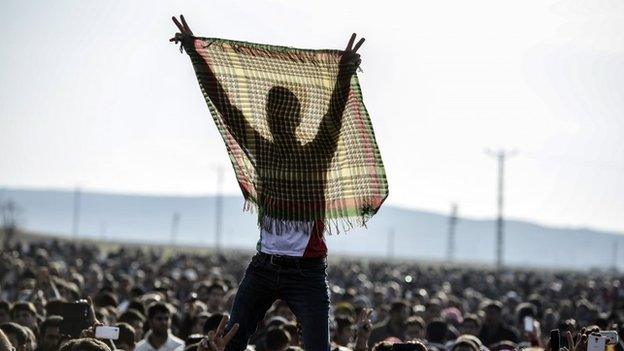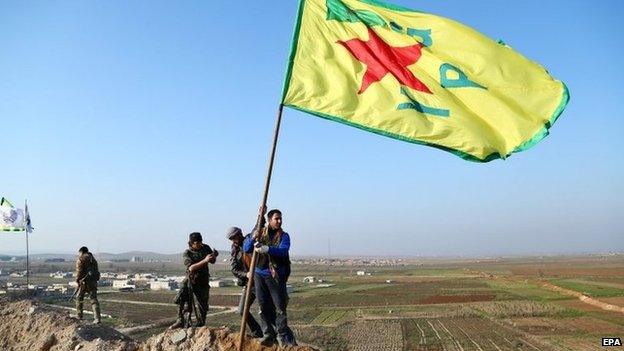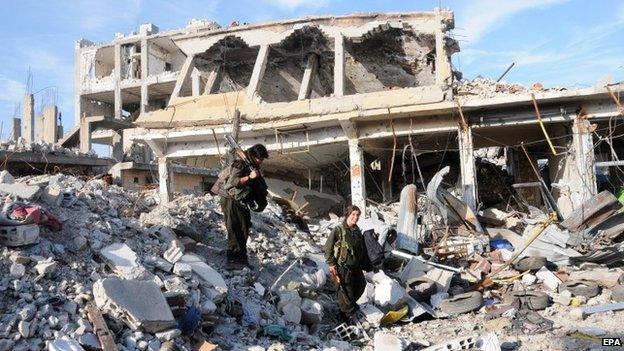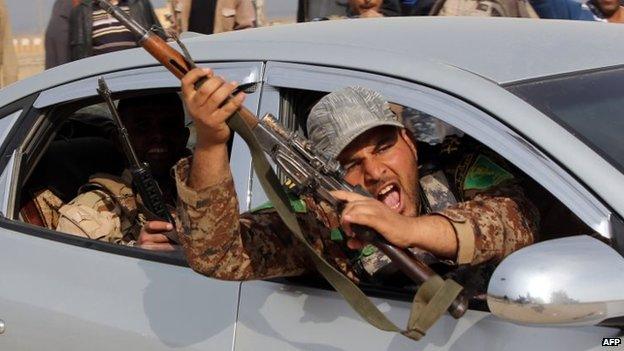Islamic State suffers setback in Kobane but battle continues
- Published

Thousands of jubilant Kurds gathered to hail the victory on the Turkish-Syrian border near Kobane
Three months ago, few observers would have put much money on the Kurds being able to stave off the Islamic State onslaught at Kobane.
Its fall to the seemingly unstoppable militants appeared to be only a matter of time. So said even the US military establishment, ostentatiously downplaying the strategic significance of the embattled Syrian town on the assumption that its fate was sealed.
That was certainly Islamic State's belief too. In late October, they issued a highly-produced video showing the British hostage John Cantlie "reporting" from Kobane, pointing out local sights and the nearby Turkish border with the message that the whole town would soon be in jihadist hands.
So the eviction of their fighters from Kobane is at the very least a huge propaganda setback for the militants and a blow to their local prestige.
The town had become invested with large symbolic significance because both IS and the Americans chose to make a stand there.
The battle for Kobane started in September, not long after US President Barack Obama had vowed to "degrade and destroy" IS. Had the US allowed the town to fall, it would have been a blow as significant as that which IS has just suffered.
That was why the Americans threw more than 700 air strikes into the battle, taking out militant targets big and small.

Media reaction
Kurdish media are celebrating the "liberation" of Kobane, with photos of jubilant residents making V-signs and waving flags featuring prominently on their websites.
The Xendan website describes it as a "historic victory" and a "story which should be told again and again", while Shafaq quotes a Kurdish MP saying Islamic State's "back" has been broken.
And the same satisfaction is evident in the Iranian press. "Fortress of IS strength crumbles, Kobane freed," says a headline in the moderate daily, Iran.

Kurdish fighters flew the flag of the Popular Protection Units on a hill overlooking Kobane on Monday
The loss of Kobane is "another deadly blow" for IS, says hardline Javan, while another conservative paper, Khorasan, says Kobane has "turned into a symbol of Kurdish resistance".
And the role of the US-led coalition in the Kurdish victory is downplayed by the conservative Siyasat-e Ruz, which says: "Kobane is another symbol of the Syrian people's determination to defend their country."
For their part, IS supporters who commented on Twitter appear to be downbeat, urging prayers for its fighters but insisting that the battle is not over.
From BBC Monitoring

They also paved the way politically with Turkey for Iraqi Kurdish Peshmerga reinforcements to cross the border and join the fray, providing heavy weapons support that the Syrian Kurdish Popular Protection Units (YPG) lacked.
Those interventions were crucial in tilting the balance against the IS fighters, although the battle could of course not have been won without the courage, tenacity and skill of the YPG guerrillas on the ground - an issue on which Turkey has distinctly mixed feelings, given the YPG's links with the Kurdistan Workers' Party (PKK).
Pushed back
While Kobane does seem to have been almost entirely recaptured by the Kurds, the fight is by no means over.
The militants retain control of countryside and villages surrounding the town. If the Kurdish forces keep up their momentum, the battle will expand slowly outwards until those areas are cleared.
A counter-attack by IS on Kobane itself cannot be ruled out, although it would be against the current tide and coalition jets will no doubt be on the lookout for preparatory build-ups.
For the Kurds themselves, it was of course vital to retain the Kobane pocket, one of three non-contiguous areas that they control along the lengthy Syrian-Turkish border.

IS may now wonder whether the battle for Kobane, which cost so many lives, was worthwhile
Strategically for IS, Kobane's capture would have allowed the militants control of a contiguous stretch of border territory and would have removed a thorn from their flesh.
But looking back, IS strategists may ask themselves whether the game was worth the candle.
Their failure to capture and secure the town has cost them dearly.
In the attempt, according to the Syrian Observatory for Human Rights (the most consistent tracker of events on the ground), they lost at least 1,200 fighters and a lot of equipment.
That has to hurt. As the US administration's point-man for the war against the militants, retired Gen John Allen, put it in November, IS "impaled itself" on Kobane. It did not really need to.
Significant setback though it may be, the blow at Kobane has clearly not broken the back of the militant movement.
It continues to rule and consolidate its control in large tracts of northern and eastern Syria, linked up with similarly impressive expanses of terrain across the border in northern and western Iraq. In some parts of Syria, fighters from the official al-Qaeda franchise, al-Nusra Front, have joined IS.

But when history looks back on current events, it may conclude that IS expansion reached its peak in August, when it launched a surprise second-wave push in northern Iraq after the shock capture of Mosul in June.
It may see Kobane not as a turning-point in itself, but as part of a process whereby IS, having been contained at its outer limits, is being pushed back slowly on various fronts.
One is in Iraq's Diyala province, north-east of Baghdad, where simultaneously with the announcement of Kurdish success in Kobane, Iraqi officials were declaring that government forces, backed by Shia militia, had rid the province of the militants.
Mosul challenge
In northern Iraq meanwhile, the Peshmerga have been making slow, methodical progress in regaining ground lost to IS in August, gradually advancing on Mosul from north, east and west.
But Mosul itself, if it is to be recaptured, cannot be a Kurdish affair. It is Iraq's second city, with a largely Sunni Arab population in normal times of something like two million.
The Kurds have said they would be willing to take part in a campaign to "liberate" Mosul, but it would have to involve a coalition of pro-government forces, and preferably significant Sunni tribal and military elements, backed by international air power.
The weak element in that formula is of course the Iraqi army, which the US spent eight years and billions of dollars to rebuild, only to watch it collapse like a house of cards when IS attacked Mosul in June.

Iraqi officials say IS militants have also lost their grip on the eastern province of Diyala
Government gains against the militants since then have been largely attributed to the involvement of Iranian-backed Shia militia alongside the army, an unhealthy combination when it comes to attacking Sunni areas where IS has taken root, such as Mosul and almost all of western Anbar province.
If such core areas were to be invaded by such forces against the will and without the support of local Sunnis, that would be to court another long-running disaster.
While plans are afoot for a campaign to retrieve Mosul, perhaps in the coming months, driving IS out of all of Iraq should require the reconstruction of the national army on a solid political and social base - a task that has barely begun - as well as the development of credible and cohesive Sunni forces.
In Syria, the picture is even more complex and equally likely to take long time to resolve.
The Kurds are hardly in a position to drive the militants out of the rest of their strongholds, and they would be ill-advised to try to move into Arab-majority areas.
IS is at odds with virtually all the Syrian rebel groups and has fought most of them, although relations vary from region to region.
Syrian stronghold
But the raison d'etre of the rebel groups (most of them now Islamist of one hue or another) is to bring down the regime of Bashar al-Assad, not sap themselves fighting jihadist militants.
American efforts to groom a "moderate" rebel force and direct it against IS are barely beginning, have questionable viability and will take a great deal of time.
Syrian government forces are also engaged against IS, though they initially appeared to condone or even encourage its growth to undermine and discredit other rebel groups.
While the Syrian army has managed to stave off IS efforts to seize the military airport at Deir al-Zour - the government's last real asset in that eastern province - it is hard to imagine it regaining the large amounts of ground it has lost there, in Raqqa province and elsewhere, any time soon.
So despite some losses around the edges, it seems likely that for the foreseeable future, the militants will retain their grip on the core of their "state".
But that could change if there is some unforeseen development, such as a turnaround in the US attitude to the Syrian regime, or reconciliation between the rebels and Damascus, or a bursting of the IS balloon from within.